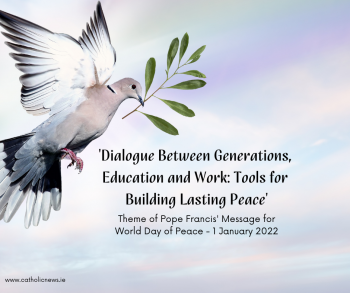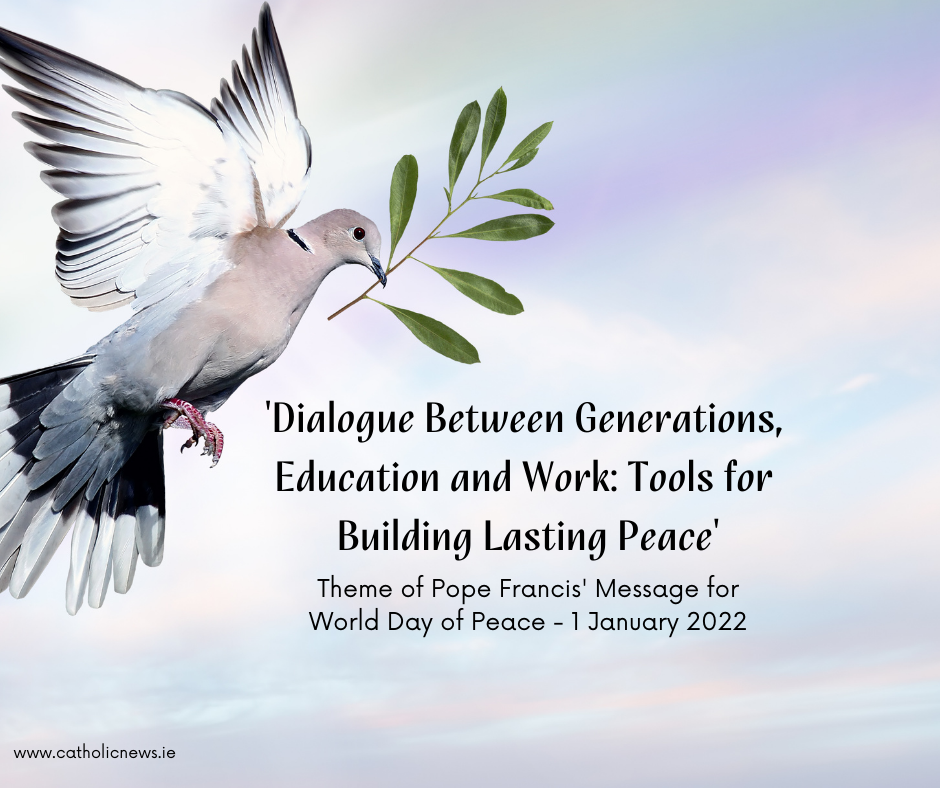
.png) Bp Gerald John Mathias
Bp Gerald John Mathias

Every year on the New Year’s Day, the Church celebrates the World Day of Peace. Each year the Holy Father sends a message for the celebration of this day. This year, on the 55th World Day of Peace, Pope Francis had this message for us: “Dialogue Between Generations; Education; and Work: Tools for Building Lasting Peace.”
In his introductory remarks, Pope Francis expresses his sadness over the fact that the path of peace which St. Pope Paul VI called by a new name of integral development, “remains sadly distant from the real lives of many men and women and thus from our human family, which is now entirely interconnected.” Despite numerous efforts, wars and armed conflicts, diseases of pandemic, effects of climate change and environmental degradation, hunger and economic slowdown add up to disruption of peace in the world.
The Pope reminds us that peace is both a gift from high and the fruit of a shared commitment. All of us, therefore, must contribute our mite towards peace beginning with our own individual hearts and families, then within the society and all working up to relationships between peoples and nations.
Pope Francis proposes three paths for building lasting peace. First, Dialogue between Generations, second, Education and third Work. A word on each:
Dialogue Between Generations to Build Peace: In a world beset with untold problems, two common reactions of people are, either to flee from reality or to react with destructive violence. But the Pope says that there is another possible option: “Yet between selfish indifference and violent protest there is always another possible option: that of dialogue. Dialogue between generations”. He goes on to explain: “Dialogue entails listening to one another, sharing different views, coming to agreement and walking together.” This sounds very much like the way we are to be involved in the current synodal process on Synodality.
We must note here that the Pope does not merely preach but works to promote peace. We recall with great admiration how a couple of years ago the Pope brought leaders of two warring factions of South Sudan together and even knelt down and kissed their feet to broker peace.
Stressing the urgent need for an inter-generational partnership, Pope Francis affirms: “Young people need the wisdom and experience of the elderly, while those who are older need the support, affection, creativity and dynamism of the young.” The Pope is of the opinion that “the global crisis we are experiencing makes it clear that encounter and dialogue between generations should be the driving force behind a healthy politics, that is not content to manage the present with piecemeal solutions or quick fixes, but views itself as an outstanding form of love for others, in the search for shared and sustainable projects for the future”. For such lasting endeavours, dialogue between the elderly (“keepers of memory”) and the young (“those who move history forward”) is necessary. Each must be willing to make room for others and not to insist on monopolizing the entire scene for pursuing their own immediate interests.
Such inter-generational dialogue is also necessary when we think of care for our common home. The environment, the Pope reminds us, “is on loan to each generation, which must then hand it on to the next.”
Teaching and Education as Drivers of Peace: To build paths of peace together we cannot ignore education which is a privileged setting and context for integral development. “Education provides the grammar for dialogue between generations,” observes the Holy Father.
However, the Supreme Pontiff laments that “In recent years, there has been a significant reduction worldwide in funding for education and training; these have been seen more as expenditures than investments. Yet they are the primary means of promoting integral human development; they make individuals free and responsible, and they are essential for the defence and promotion of peace. In a word, teaching and education are the foundations of a cohesive civil society capable of generating hope, prosperity and progress”.
While there is a significant reduction in the funds for education, on the other hand, military expenditures have increased and they seem certain to grow exorbitantly, says the Holy Father. He goes on to call governments to “develop economic policies aimed at inverting the proportion of public funds spent on education and on weaponry”.
The Pope hopes that “investment in education will also be accompanied by greater efforts to promote the culture of care…. A country flourishes when constructive dialogue occurs between its many rich cultural components: popular culture, university culture, youth culture, artistic culture, technological culture, economic culture, family culture and media culture”.
Pope Francis says that it is essential then “to forge a new cultural paradigm” through “a global pact on education for and with future generations, one that commits families, communities, schools, universities, institutions, religions, governments and the entire human family to the training of mature men and women”.
It is by investing in the education and training of younger generations, we can help them, through a focused programme of formation, to take their rightful place in the labour market, affirms the Pope.
Creating and Ensuring Labour Builds Peace: “Labour is an indispensable factor in building and keeping peace”. Humans are social animals. We always work with or for someone. Hence the work place enables us to learn to make our contribution towards a more habitable and beautiful world.
The Pope is well aware that the Covid-19 pandemic has negatively affected the labour market. Millions of economic and productive activities have failed. Migrant workers have suffered particularly with no system of welfare or social security for them. Violence and organized crimes are on the increase in many countries. The only answer to this is “an expansion of dignified employment opportunities” according to the Holy Father.
“Labour, in fact, is the foundation on which to build justice and solidarity in every community. Peace is not possible without justice and solidarity. Efforts must be made to encourage a renewed sense of social responsibility, so that profit will not be the sole guiding criteria.” The fundamental human rights of the workers must be respected. When justice is ensured and human rights are respected, the workers will themselves contribute to building peace.
Holy Father concludes his World Day of Peace Message with the following appeal to government leaders, those with political and social responsibilities, priests and pastoral workers, and to all men and women of good will: “Let us walk together with courage and creativity on the path of intergenerational dialogue, education, and work. May more and more men and women strive daily, with quiet humility and courage, to be artisans of peace. And may they be ever inspired and accompanied by the blessings of the God of peace”.
Let us pay heed to the Holy Father’s appeal and to his peace message. Let us use the three tools proposed by him and contribute our share in building world peace. Peace be with you!
(The writer is the Bishop of Lucknow)